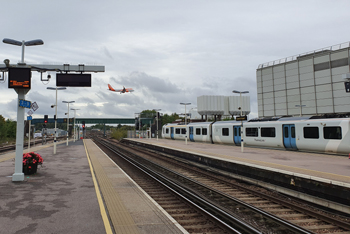Train companies have called for a shake-up in transport tax policy that would see taxes on air travel rise to make long-distance rail fares cheaper.
The Rail Delivery Group (RDG), which represents both rail firms and Network Rail, said its proposals to influence the Government’s Transport Decarbonisation Plan would create a level (and green) playing field where levies reflect how damaging a mode of transport is to the environment.
‘This would enable Britain to build back better by encouraging a green recovery from the COVID-19 pandemic,’ it said.
The RDG pointed out that fuel for passenger aircraft is exempt from tax but said that rail firms have seen levies on electricity to power trains more than double in the past four years.

Gatwick rail station
It said taxes now make up almost 40% of the total electricity costs for train operators, with studies showing that compared to other modes of transport air passengers pay a much smaller proportion of the climate costs associated with their travel.
The RDG said using increased taxes on air routes that are in direct competition with trains to reduce prices for long-distance rail fares would incentivise people to make ‘greener choices’ when travelling in Britain or to international destinations that are easily reachable by rail, such as Paris or Amsterdam.
Robert Nisbet, the RDG’s director of nations and regions, said: ‘To help Britain reach its target of net zero emissions, transport taxes should reflect how polluting a journey really is and encourage people to make greener choices.’
Mike Childs, head of policy at Friends of the Earth, said: ‘The polluter pays principle is an essential tool for getting people out of planes and cars and onto trains, buses and bikes. It can’t be right that it's more costly to do the right thing for the planet.
‘Rail and bus fares need to be cheaper and cycling made safe. The money to achieve this could come from higher taxes on flying and gas-guzzling cars.’
The RDG said official figures released last year showed that the CO2 emissions from a domestic rail journey are more than six times smaller than a domestic flight, while the independent Committee on Climate Change has predicted that aviation is likely to become the largest contributor to UK emissions by 2050.
The suggestions from train companies are part of a six-point approach submitted to influence the Department for Transport’s decarbonisation plan, due to be published later this year.
Alongside tax changes and existing calls for reform of rail fares regulations, the RDG’s six-point approach transport decarbonisation includes:
- incentives for people to switch freight from road to rail, with each freight train carrying as much as 76 HGVs on average
- a rolling programme of electrification to build on the achievement of electrifying 40% of the network
- including carbon targets within future management contracts and giving a new National Rail Body responsibility for carbon monitoring and environmental regulation of the rail industry
- developing zero carbon, integrated transport hubs to promote the use of active travel and low-carbon modes for the customer’s onward journey.
'Scrap fares rise'
Separately, Campaign for Better Transport said the Government should cancel January’s rail fare rise and reform fares, prioritising the introduction of flexible season tickets.
The call comes ahead of the announcement of July’s Retail Price Index (RPI) figure next week, which is usually used to set maximum increases for regulated fares.
Chief executive Darren Shirley said: ‘Millions of people around the country are starting to plan their return to work and a rail fare rise in January is the last thing they need.
‘Raising rail fares when people are already staying away from the railway will further damage the economy and the environment at a time when we need to be investing in a green sustainable transport-led recovery.’
Register now for full access
Register just once to get unrestricted, real-time coverage of the issues and challenges facing UK transport and highways engineers.
Full website content includes the latest news, exclusive commentary from leading industry figures and detailed topical analysis of the highways, transportation, environment and place-shaping sectors.
Use the link below to register your details for full, free access.
Already a registered? Login